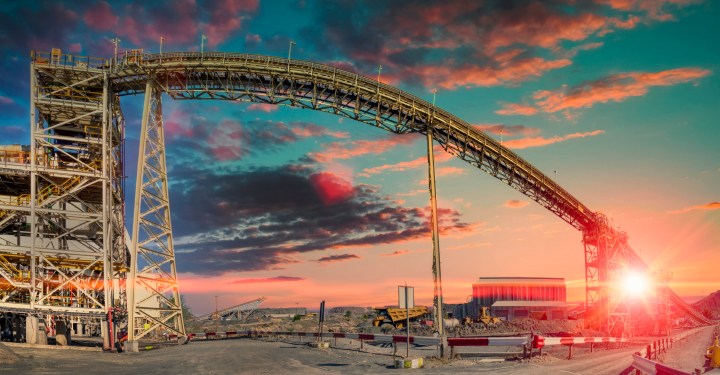BUSINESS REFLECTION
After the Bell: Rock bottom — SA and the Fraser Institute’s survey of mining jurisdictions

On the global mining exploration stage, Botswana is a rock star, strutting its stuff like the late Johnny Clegg belting out an ode to Zulu warriors marching to battle. South Africa is rock bottom, its tone-deaf lead singer croaking out an unmelodious tune as he stumbles around a stage darkened by Eskom.
Botswana’s rock star status was further cemented in the Canadian-based Fraser Institute’s latest annual survey of mining companies, which is heavily focused on exploration. Under the category “most attractive jurisdictions for mining investment”, Botswana ranked 10th out of 62 and was No 1 in Africa.
The survey ranks Canadian provinces and US and Australian states as “jurisdictions” and the rest as countries, so Botswana would actually be rated fourth as a country. And on policy — the survey includes a separate Policy Perceptions Index (PPI) — Botswana ranked second in the world, out of 62.
By comparison, South Africa once again cemented its rock-bottom status, scoring 57 out of 62 in the overall Investment Attractiveness Index. Last year it was 75 out of 84. And on the PPI, it ranked 53 out of 62 compared with 65 out of 84 previously.
So, why is Botswana glittering like a diamond under a Kalahari sky while South Africa is a lump of dodgy coal getting stuffed into an Eskom power plant?
“On policy, Botswana is the highest-ranked jurisdiction in Africa and the second-highest in the world, (2nd of 62) in 2022. Botswana’s increase in its PPI score (23 points) reflects decreased concerns over uncertainty concerning protected areas, infrastructure, political stability, and labour regulations and employment agreements,” the report says.
The “decreased concerns over uncertainty concerning protected areas” is revealing and also, well, concerning. Daily Maverick reported earlier this year that there is a scramble for oil, gas and coal in Botswana, much of it centred on the Central Kalahari Game Reserve.
Botswana, one of the last great refuges of iconic African wildlife, has effectively opened up much of its protected space to mineral and hydrocarbon exploration. “Uncertainty” around protected areas there has indeed evaporated. And that raises red flags in an era when environmental, social and governance (ESG) issues are high on the corporate agenda.
Any company that wants to drill for oil or build a mine in a Botswana nature reserve is probably not big on ESGs, and that will strike many as an off-key tune.
A functional mining cadastre
But, as we have also noted in our reporting — and this is one of the areas where Botswana’s policy shines — the government is completely transparent about this state of affairs. That is because Botswana has a functional mining cadastre, which is an online portal that allows the public access to view existing mining rights, exploration permits and related stuff. Companies can also use the system to apply for such rights, with the applications processed swiftly and efficiently.
South Africa, of course, is an utter laggard in this regard.
The Department of Mineral Resources and Energy under Minister Gwede Mantashe wasted years trying to reinvent the cadastre wheel instead of attempting to procure an off-the-shelf and proven option like Botswana’s to replace its useless Samrad system, which has been clogged by massive backlogs in mining rights applications. That has raised suspicions that it is not all that interested in transparency, which does nothing to advance the perceptions around its policies.
It must be said there is finally light at the end of this tunnel and tender applications are now being processed after what appears to have been a transparent process.
Read more in Daily Maverick: Government departments (finally) issue request for bids for Mining Licensing System
The Fraser Institute’s findings jibe with others, such as data gathered by S&P Global for 2022 that showed South Africa last year accounted for 0.80% of global exploration expenditure.
Read more in Daily Maverick: Mantashe’s missed mining target — SA still accounts for less than 1% of global exploration spend
South Africa has not accounted for more than 5% since 2004, when the Mineral and Petroleum Resources Development Act (MPRDA) came into effect, giving rise to the original Mining Charter with BEE and other targets that are onerous from an investment perspective.
The Fraser Institute’s methodology is not without its critics, not least for its focus on exploration and the relatively small sample size — 180 responses.
“It is easy to pick holes in the Fraser survey’s methodology, but what I think is more important is the overall downward trajectory over the two decades since the MPRDA and first mining charter were negotiated,” said Paul Miller, director of the consultancy AmaranthCX.
South Africa’s geology alone should still be a draw for exploration. Home to by far the biggest known platinum group metals and manganese deposits in the world, there is still much unexplored terrain, especially in the Northern Cape.
But poor policy will leave a treasure trove in the ground.
It’s also surely revealing to note the company that South Africa shares at the bottom of the pack.
China, Democratic Republic of the Congo, Papua New Guinea and Tanzania are ranked above South Africa in the bottom 10 of the Investment Attractiveness Index. Zimbabwe, Mozambique, South Sudan, Angola and Zambia are ranked below South Africa.
Zambia’s ranking is a bit of a jolt. The newish government has been praised for reforms designed to attract foreign mining investment, and its own cadastre shows that the country is a hive of exploration activity.
Zambia’s poor ranking may, on one hand, raise questions about the survey and its methodology. But it may also highlight a salient point: once you fall to the bottom, it’s hard to change investors’ views.
Perceptions can become embedded in stone, and that is a hard rock to roll. DM/BM



















Comments - Please login in order to comment.